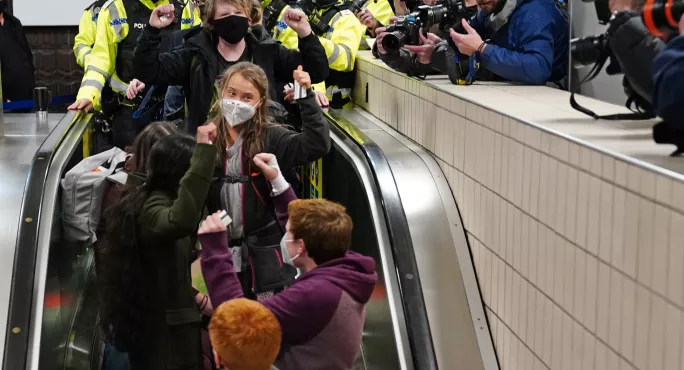Opinions among adults about what we can expect from COP26 range from the utmost pessimism to cautious optimism, but I am certain that the view looks very different from the perspective of young people. What I’m seeing in my school is, I expect, very similar to schools across Scotland: there is a sense that something special is going to happen, and that this will be the turning point needed for a sustainable future to become a reality.
I’ve been working with The New York Times to develop the Educate on Climate Programme at their bespoke venue at SWG3. The Climate Hub will play host to an incredible indoor forest designed by Es Devlin, and online tickets are free. In putting together content for an audience of teachers, we spent many months considering what the most crucial issues are.
So what can you expect to gain in terms of your professional development? Here are three big ideas that will be in sharp focus.
1. Critical thinking is critically important
Teaching about climate change is difficult, given the politics that surrounds it. When pupils engage in learning about sustainability they are confronted by a mass of misinformation. To help them navigate this, we need to equip them with critical thinking that allows them to sift fact from fiction. Put simply, how can they know if a “fact” is accurate or misleading? This is basic epistemology, and it needs to start at as young an age as possible. Teachers of all ages and stages will be challenged to think about how this can be done even more effectively.
Long read: The key role that schools can play in tackling the climate crisis after COP26
Tes Scotland leader: Why teaching hope is key to tackling climate change
WATCH: Nobel winner’s COP26 message for old schools
Climate change: How can pupils and teachers get involved in COP26?
Quick read: How to use COP26 to reduce pupil climate anxiety
Global reach: How our school will bring COP26 to students worldwide
2. Climate tech is the future
If we’re thinking about solutions to sustainable problems, we’re thinking about technology. This is where climate tech comes in, and right now the tools we have are inadequate for the task. That means we will see a huge amount of development - so much so that Professor Aaron Cohen of New York University believes that climate tech will be even bigger than the internet revolution. There will be opportunities aplenty for innovators, so empowering pupils through learning in both science and entrepreneurship is high on the agenda.
3. The biggest disruption will come from the youngest voices
COP26 might just be the first global event where more attention will be focused on young voices than heads of state. The event I’m most looking forward to is the youth activism panel being chaired by Professor Peter Higgins of the University of Edinburgh. Two of America’s most prominent youth leaders, Hannah Testa and Sophia Kianni, will be discussing their ideas with two of Scotland’s up and coming voices, Charlotte Muller-Stuart and Anish Subramaniam. We talk a lot about agency in Scottish education, so if you only do one thing for COP26 then let your pupils watch this session. It might have more impact than anything said by any politician.
It’s been a fascinating challenge working on the Educate on Climate Programme and the line-up is impressive. Educators such as Saku Tuominen and Professor Rose Luckin will be sharing a platform with disruptive thinkers such as Chris Van Der Kuyl and Zubeda Limbada.
The brief for all our speakers and panelists is that they need to give teachers practical takeaways so that they can enhance what they do in their classrooms and communities. We won’t be short on new ideas and fresh thinking.
Robin Macpherson (@robin_macp) is head of college at Robert Gordon’s College, in Aberdeen.
The free Educate on Climate event - part of The New York Times Climate Hub in Glasgow - takes place this Friday, 5 November. Details and tickets can be found here.





